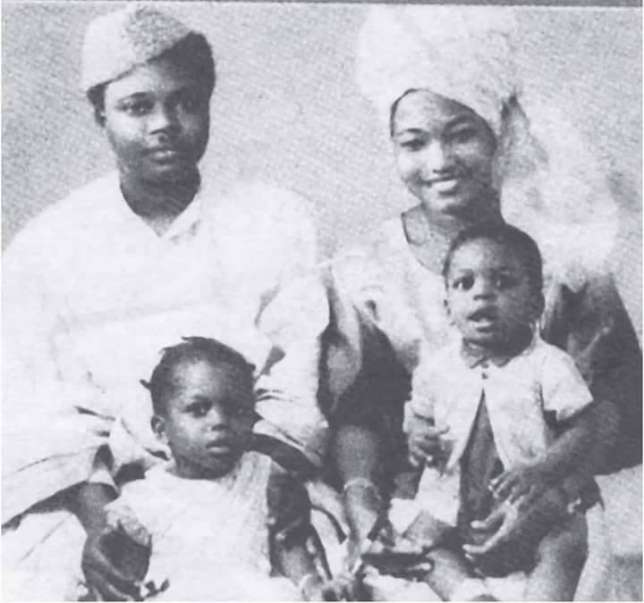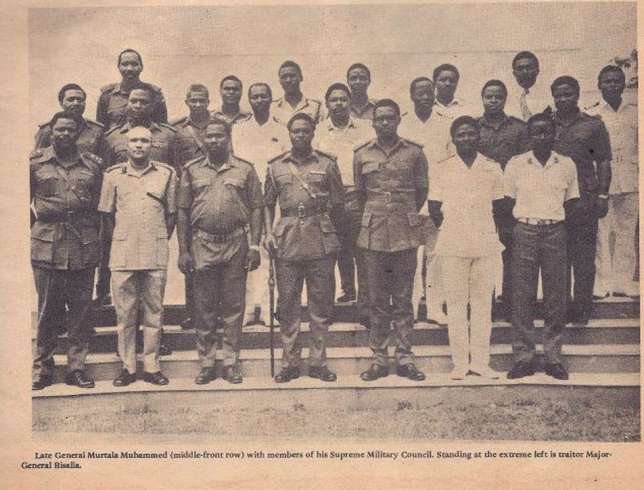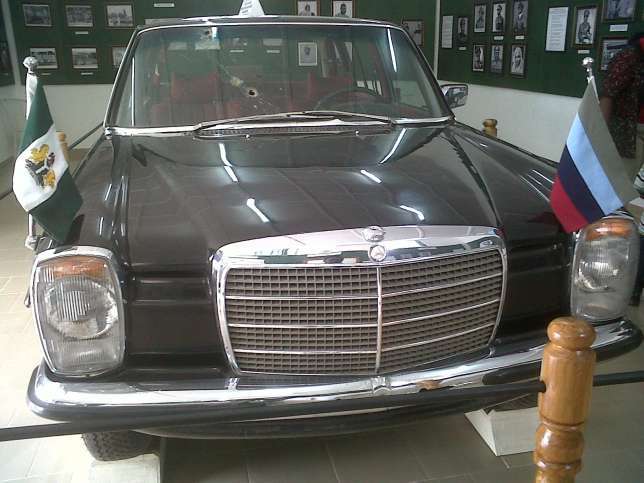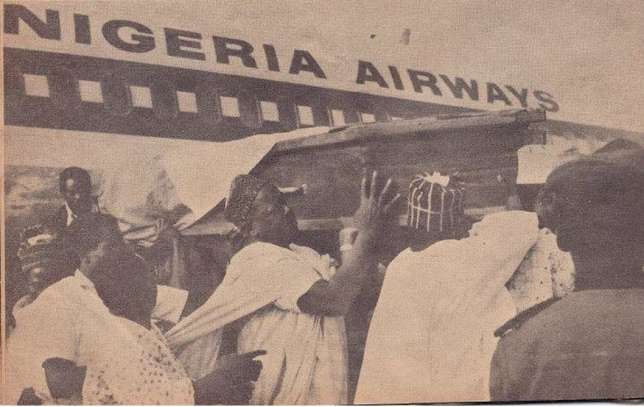Hot Stories
Recent Stories
The Full Story Of How Ex Head Of State, Murtala Mohammed Was Killed 42 Years Ago
Posted by Samuel on Tue 13th Feb, 2018 - tori.ngThe story has been told of ex Nigerian military leader, Murtala Muhammad and how he was killed some years ago.

Murtala Mohammed, Ajoke, his young wife and his two kids. (TIN Nigeria)
He was whipping up a popularity that had fizzled out since Nigerian politicians in the First Republic discarded the trust of the Nigerian people, but that counted for nothing when 42 years ago today, on the 16th of February 1976, General Murtala Ramat Mohammed, was shot down by coup plotters, in the midst of Ikoyi traffic, while on his way to work.
Today, anyone who has grown around the typical Nigerian displays of power would have a hard time understanding why a sitting military head of state would drive through Lagos traffic with no security.
Yet this was only a reflection of the genteel and almost reckless lack of self-importance with which Murtala, as he was fondly called by most Nigerians, went about his business.
Born on 9 November 1938 in Kano, one of his parents’ 11 children, Murtala joined the army at the age of 19.
Within 10 years, on the strength of his work ethic and numerous degrees and training programs, he was made Colonel, barely 30 at the time.
During this time, Murtala played a role in unseating Aguiyi Ironsi from power, after the latter took the seat in January 1966.

Murtala Mohammed and members of the Supreme Military Council (TIN Nigeria)
On 29th July 1975, General Yakubu Gowon was overthrown while attending the 12th summit of the Organisation of African Unity (OAU) in Kampala, Uganda.
Muhammed, who had just recently been made Federal Commissioner for Information (equivalent to the role of Minister for Information and Communication in today’s administration) took power as the new Military Head of State.
Murtala, with Olusegun Obasanjo as Chief of Staff, Defence HQ, (a role which was practically the same as being Vice President), set about changing a lot of the policies and overhauling the institutions that had made Gowon unpopular in his final days in power.
A popular leader
Within the short span of 201 days, he was able to restore a love for the nation, a clear sense of patriotism that had been lost when Nigeria’s first civilian leaders first began to show that having the key to the vault means that money will begin to vanish and then show up in unexpected places, in expensive cars and fat bank accounts.
After the rigours of the civil war, Murtala set about to re-organising and demilitarising a large wing of the Nigerian army, reducing the total number of active soldiers by 100,000.

General Murtala Muhammed was assassinated in this Mercedes Benz (Naija Underground)
As head of state, Muhammed put in place plans to build a new Federal Capital Territory due to Lagos being overcrowded.
A panel headed by Justice Akinola Aguda chose the Abuja area as the new capital ahead of other proposed locations.
On February 3, 1976, Muhammed announced that the Federal Capital would in the future move to a federal territory location of about 8,000 square kilometres in the central part of the country.
After it was alleged that the 1973 census was heavily weighted in favour of the North, Murtala cancelled and nullified the results, much to the pleasure of the other regions who were desperate for equal representation.
These actions reflected the ethos of a man who felt he would treat everyone as he wished to be treated.
Murtala was seen as very upright and he dealt with his colleagues and everyone else with a sense of expectation.
Many in that time say he was a natural born leader, charismatic, direct and ambitious. His decisiveness, especially, won him popular support among Nigerians.
However, Murtala was a young soldier from the North. Among his region and other soldiers who felt they deserved a bigger say in the direction of the country, his changes seemed too abrupt, too radical, too intense even. Some called him mercurial.
Ultimately, coupled with his belief that his reckless abandon, this led a group of soldiers to call time on his government and cut him down in his prime.
Murder in the Capital
On February 13, 1976, General Murtala Ramat Mohammed was on his way to work in Dodan Barracks. While sitting in his Black Mercedes Saloon Car along with his Aide-De-Camp (ADC), Lieutenant Akintunde Akinsehinwa, he was ambushed by a group of soldiers.
Murtala, along with his entourage, was killed in a hail of bullets, a task that was made all the easier because the only visible sign of protection was a pistol carried by his orderly.
His assassination was part of a coup attempt led by Lt. Col Buka Suka Dimka, who was the head of the Nigerian Army Physical Training Corps. On killing the Head of State, the coup plotters swung into action, taking, first, the media.
Murtala had made a meal of nationalising private media, including the two largest newspapers and strengthening the reach of state-owned media, particularly the radio network.
Around late afternoon, on that day, Dimka announced on the radio that the Young Revolutionaries had taken over the government. He went ahead to declare a 12-hour curfew.
His message was played throughout the day on radio alongside martial music.
This development heightened an already tense atmosphere. Many knew that Murtala had been killed and in a country where war was only a recent memory, there was already a rumour-based list of things to expect.
Dimka’s announcement confirmed that this was an attempt, however successful, to wrestle power from the government.
It threw everyone and everything into a state of pandemonium. In Lagos, people were too scared to come out of their homes and go to work, for fear of reprisal attacks by troops loyal to Murtala or a tussle between both sides.
The disorder and confusion were not limited to Nigerians alone.

Murtala's body recieved in Kano. (TIN Nigeria)
How Arthur Ashe and Pele almost got trapped in Nigeria
Nigeria in the 70s was enjoying a massive oil boom. The proceeds of this new found wealth made its way into building infrastructure and making cities like Lagos a desirable destination for the West and corporate concerns.
The coup happened while the city of Lagos was playing host to the World Championship Tennis Pro Circuit Series.
Players like Arthur Ashe, Jeff Borowiak and Dick Stockton were vying for the prize money while enjoying the many bounties that Lagos has to offer.
Stockton had informed his colleagues at the Federal Palace Hotel where they were staying, of the coup after Paul Svehlik, the WCT tour manager had called him to tell him about the assassination.
Further down the hall, the Brazilian football legend, Edson Arantes de Nascimento, or Pele as he is known the world over, was listening to the radio. He had come to the country as part of a tour sponsored by Pepsi.
From the moment that the first bullets rang out and Dimka’s voice went on the radio, their lives were suddenly at risk.
Troops loyal to the Federal Military Government made an attempt to take back the radio station from the coup plotters.
By 3.00 in the afternoon, the Nigerian Broadcasting Corporation went off the air. In the tussle, Dimka narrowly escaped being shot.
In time, control of the radio was regained and with highlife music announcing its return, the radio station came back on the air.
By 3 o’clock in the afternoon, the Nigerian Broadcasting Corporation went off the air. The Federal Government wanted to take over the radio station from the coup plotters.
Dimka narrowly escaped from the gunfire. After the premises was recaptured, the radio station came back on the air with highlife music.
By evening, the Federal Government announced that the coup was successful and a curfew was still in effect.
The silence over Murtala’s death was raised when on February 14, the Federal Government announced that Murtala had died and Olusegun Obasanjo was the new Head of State.
The FG also announced a seven-day mourning period for the slain leader.
The sentiment at the time, and it is one that remains to this day, was that the American Central Intelligence Agency (CIA) had murdered Murtala. Nigeria was not the place for any foreigner to be in those days.
The foreign contingent of the WCT faced some trouble in leaving. The military disrupted the rest of the games, entering into the courts and ordering everyone out with automatic rifles and clubs.
Players, support staff and journalists got the brunt of the soldiers’ anger.
One of them, a Daily Mail tennis correspondent John Parsons was hit by a club by a soldier, leaving an 18-inch scar on his back. Parsons was on his way to the Reuters office in Lagos to file the breaking story when he was assaulted.
Eventually, after much maneuvering, the Federal Military Government provided transport for the players and they left the country.
Pele, on the other hand, found refuge in the home of the Brazilian Ambassador, before flying out of the country.
After Obasanjo was announced President, he set his efforts to bringing Dimka to justice.
The colonel had not been seen since he fled the premises of Radio Nigeria in Ikoyi after the coup so he quickly became the focus of a massive manhunt.
Dimka was eventually arrested in the company of a female companion, at Friendship Hotel in Afikpo, in Eastern Nigeria.
Following a court-martial, Lieutenant Colonel Dimka and another 38 military officers and civilians were executed by firing squad.
Gone, but not forgotten
Looking back today, it says much that Murtala enjoys perhaps the cleanest legacy of any Nigerian military leader.
His biggest criticisms have come not from that era but from the civil war. Nigerians may forget but the people of Asaba remember when his division of the army murdered a majority of the town’s male population, creating an imbalance that is still evident till this day. That mass murder is known as the Asaba Massacre and it remains one of the biggest scars from the civil war.
Our failure to address that part of our history has played in his favour, as with many of his peers. But that takes nothing away from the work he did after.
Despite spending just over half a year in power, he left an imprint of dedication and empathy.
In return, Nigeria’s leaders have shown him love and appreciation.
He was the first Nigerian to have his depiction on Nigerian currency, specifically the 20 Naira note.
The International Airport in Lagos is also named Murtala Mohammed Airport in his honour.
In almost every city or state of the country, there are streets, parks, gardens, buildings and other monuments named after him.
We hope today that the military era of Nigeria’s past is gone, for good, but while we have the benefit of hindsight, we will look back at days like that fateful morning in February and think about what it could have been.
Top Stories
Stories from this Category
Recent Stories

Sit-At-Home: Our People Can’t Be Coerced Into Abandoning Nnamdi Kanu — IPOB Hails ‘Total Compliance’











































